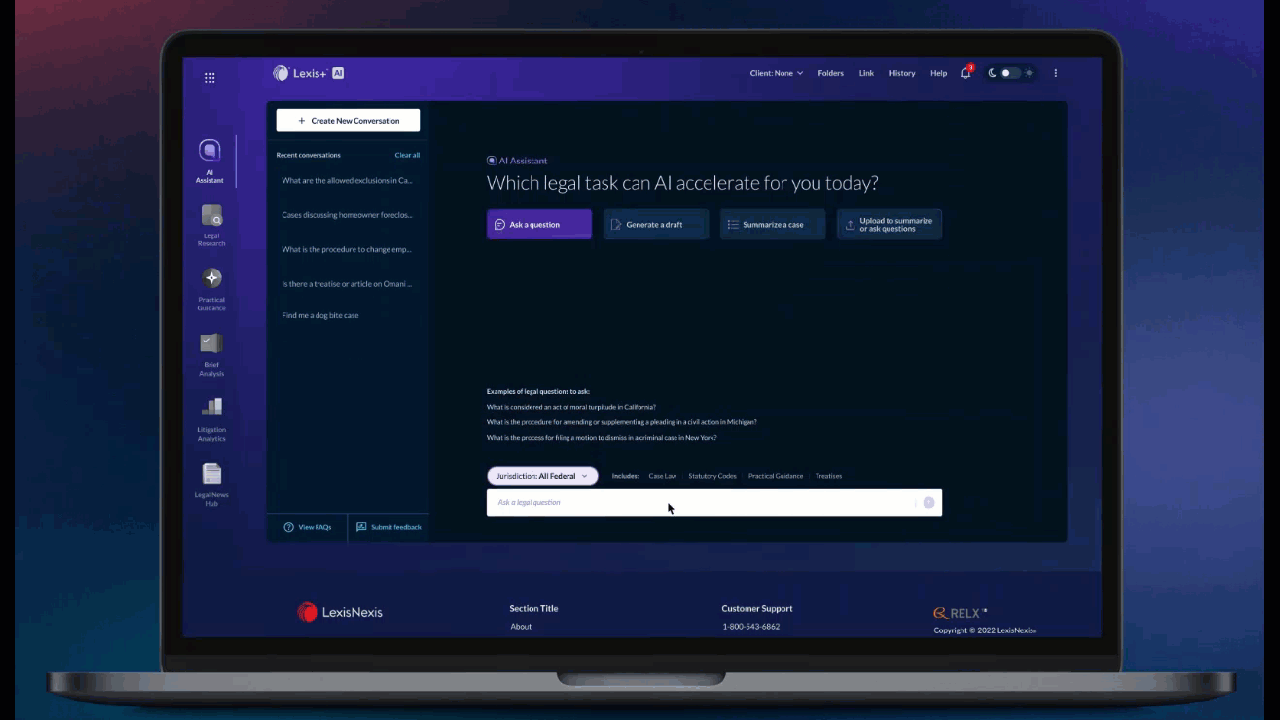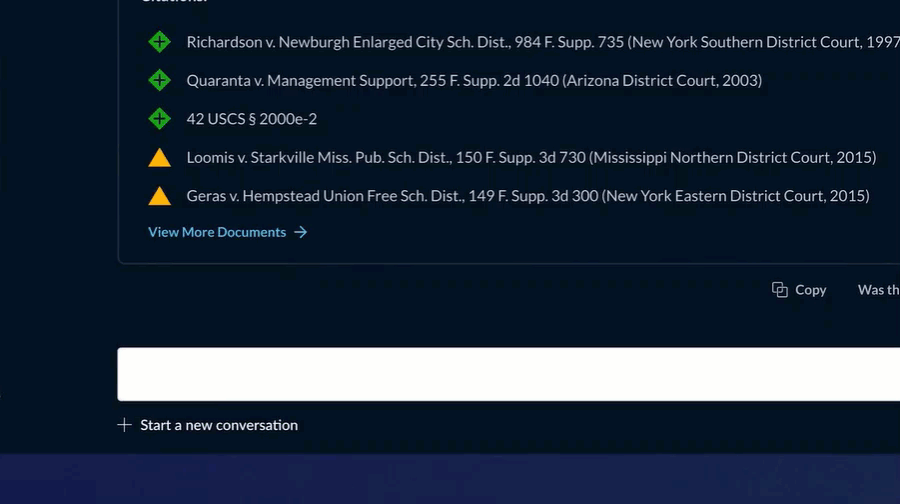[ad_1]

Image courtesy of LexisNexis.
Lexis+ AI, the latest entry to LexisNexis’ line of powerful legal research tools, has been released to the broader legal market.
Above the Law spoke with Jake Nelson, Senior Product Manager for machine learning and artificial intelligence at LexisNexis, to learn more about the unique ways the company incorporated extractive and generative AI to create a product that not only drives faster, better research, but also frames the research process in an accessible, conversational manner.

Graphics courtesy of LexisNexis.
An AI That Cites Its Sources
The legal industry’s increasing adoption of AI wasn’t without its troubles. LexisNexis has been in the machine learning game for decades, however, and adapting the massive potential of AI to speed up and improve legal workflows in a way that maximizes accuracy and security is almost second nature.
“Our work with extractive AI laid the foundation for our work with generative AI products and features,” Nelson explains. “Lexis+ AI leverages the strong foundation we have in extractive AI to feed these large language models with the best possible information. Better information means better and more reliable generative outputs, regardless of your research or drafting task.”
Lexis+ AI generates responses based on the company’s huge (and growing) repository of primary law, secondary sources, Practical Guidance, constitutions and court rules, and more, providing a list of sources for attorneys to review in detail.
When applicable, those sources also come with reports from Shepard’s Citations, allowing attorneys to build their research on the highest quality source material possible. Users can also flag potentially inaccurate citations.
Instant Answers For Your Legal Questions
While Lexis+ AI might be relatively new to the public, the product was designed and reworked through an ongoing process that drew on feedback from legal professionals. According to Nelson, this process helped LexisNexis zero in on the most common tasks attorneys use (or would like to use) AI for: asking legal questions, summarizing cases and other legal documents, and drafting a range of communications, litigation, and transactional outputs.
Asking a legal question in Lexis+ AI feels more “like engaging with a colleague” than a more traditional research process, Nelson says. Just like a knowledgeable colleague, Lexis+ AI will prompt users for clarifying information when necessary to return the most accurate and helpful response.
These prompts not only improve the usefulness of answers provided by Lexis+ AI, but also significantly reduce the learning curve for prompting the product, making it easy for even the most AI-wary attorneys to seamlessly integrate the tool into their workflow.
From the initial output provided by Lexis+ AI, attorneys can view summaries of the most relevant materials for their particular question before diving deeper into the output with the click of a button.
Generate Documents That Reflect Your Goals And Strategies
The generative capabilities of Lexis+ AI may, however, shine brightest in the context of drafting a variety of legal documents and portions of documents, including legal arguments, memoranda, letters, emails, and clauses.

Graphics courtesy of LexisNexis.
“A lot of drafting depends on style, on tone, and on the nuance that makes you unique as a legal professional,” Nelson says. He demonstrates how the AI allows attorneys to incorporate that nuance with the example of a cease-and-desist letter related to a music copyright dispute.
The initial draft is measured in its tone, using phrases like “your client has copied substantial original elements” and “we will have no choice but to pursue all legal remedies available.”
With a simple follow-up prompt — “Please make this letter more aggressive” — the tone of the entire letter shifts dramatically while still leveraging the accurate, foundational content used for the first draft. Phrases like “your client’s song brazenly infringes” and “we will file a lawsuit” (followed by a series of specific possible legal actions) pare down the diplomatic tone of the original draft, allowing the attorney author to convey the severity of the alleged infringement without spending time rewriting the original draft.
Lexis+ AI also keeps track of the changes it makes to a draft and can be prompted to report specifically what changes were made.
Summarize Materials Without Missing The Essentials
Attorneys are frequently called upon to have a working understanding of different cases relevant to their work, often while under a strict time constraint. Lexis+ AI’s “summarize a case” capability provides users with succinct, accurate overviews of specific cases, offering a way to quickly gain an understanding of an important case. To prompt this output, users need only provide the citation or case name.
“Lexis+ AI will first look to see whether we’ve had an editor write a summary on the case but, if one doesn’t currently exist, we’re now able to generate them on the fly,” Nelson says.

Graphics courtesy of LexisNexis.
Summaries from Lexis+ AI include a range of information, including key legal holdings, a list of relevant material facts, controlling law, the rationale of the court, and the outcome of the case. All case summaries generated by AI are clearly marked with a large, purple label.
“Transparency is key for us,” Nelson explains. “We strive to impress upon anyone who engages with Lexis+ AI that while it provides access to best-in-class AI solutions for legal professionals, each user is ultimately in the driver’s seat.”
Maximum Security For Your Search
As with any legal tech tool, maintaining a high degree of security and privacy when using generative AI products is of paramount importance — including when using Lexis+ AI’s ability to answer legal questions or provide a summary based on a document uploaded by the user rather than content drawn from LexisNexis’ repository.
This function is reminiscent of the Document Analysis users might remember from versions of Lexis+ that primarily used extractive AI. With Lexis+ AI, however, the process of engaging with a document is significantly more conversational, and the benefits of incorporating generative AI to accelerate the interaction are clear.
“We build all products at LexisNexis, including Lexis+ AI, with privacy and security in mind,” Nelson explains. “We recognize the imperative of maintaining attorney-client privilege.”
To dive deeper into the possibilities offered by Lexis+ AI and to request a free trial, visit LexisNexis.com.
[ad_2]




